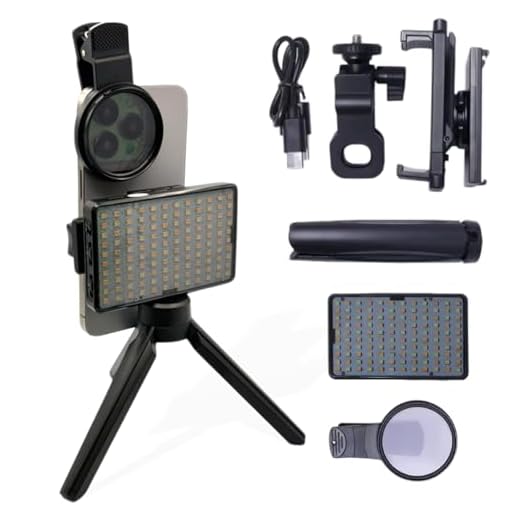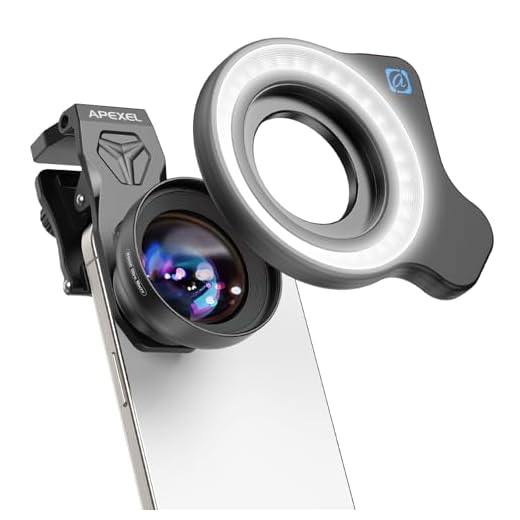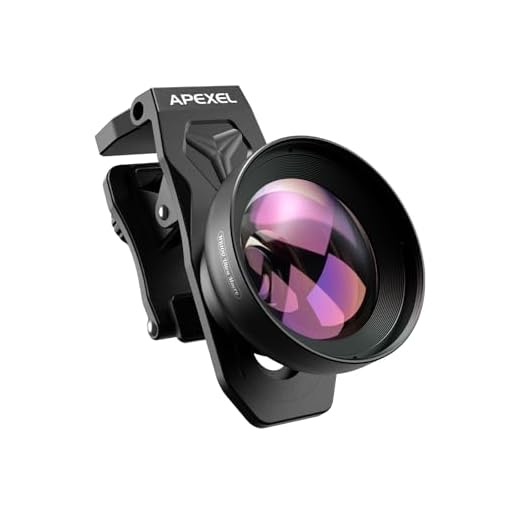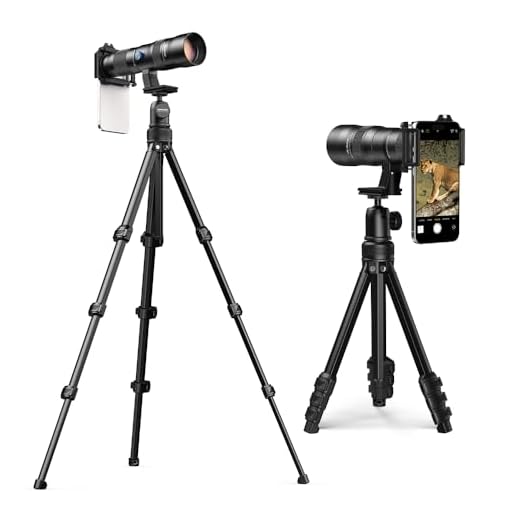



For those diving into beauty content creation, I’ve found that a prime lens with a wide aperture, such as an 85mm f/1.8, really excels in capturing detailed skin textures and vibrant makeup colors. This specific choice minimizes distortion, allowing for flattering portraits that highlight the subtleties of makeup application.
This article will be a valuable resource for aspiring beauty influencers, makeup artists, and anyone interested in creating visually stunning makeup visuals. I will share insights on various lens options, discussing their benefits and how they can enhance your videography or photography skills in the beauty niche.
Additionally, I’ll cover important features to look for, such as focal length, aperture size, and autofocus capabilities. Whether you’re filming Instagram reels or crafting high-quality YouTube content, understanding these elements can significantly improve your work.
Best Lenses for Makeup Demonstrations
For anyone producing content focused on beauty application, choosing the right optics can greatly enhance the clarity and detail of your visuals. It is crucial to select optics that ensure your audience can see every nuance of your techniques.
Prime optics with a wide aperture are advantageous for achieving stunning backgrounds blurred out while keeping the focus sharp on your subject. This creates a professional look that draws attention to the details of the application. Additionally, focal lengths around 50mm to 85mm are often ideal, allowing for a comfortable distance and flattering perspective.
Key Features to Consider
- Aperture: A wider opening (like f/1.8 or f/2.8) helps in low light situations and provides beautiful bokeh.
- Focal Length: A range between 35mm to 85mm often provides suitable framing for your face.
- Image Stabilization: This feature can reduce the effects of camera shake, especially during close-up shots.
In addition, macro optics can be beneficial for extreme close-ups of products and application techniques. This enables viewers to see the texture and application method without losing detail.
If your work involves showing various lighting conditions, consider optics that perform well in diverse environments. The performance in low-light situations can be improved with lenses that have a larger maximum aperture.
| Feature | Benefit |
|---|---|
| Wide Aperture | Improves low light performance and enhances background blur |
| Short Focal Length | Facilitates close-up shots without distortion |
| Macro Functionality | Allows capturing fine details of products and techniques |
Choosing the right optics is not solely about specifications, but also about how they feel during use and the results they produce. Test various options to find what complements your style and delivers the clarity required for your visual content.
Essential Features for Makeup Photography
For capturing stunning visuals that highlight cosmetic artistry, I prioritize the right specifications in my photography equipment. A wide aperture is crucial, allowing ample light to enter and creating that desired soft background blur, ideal for emphasizing the subject’s features. This can bring out the intricacies of colors and textures, making them pop in the final image.
Another significant aspect is the focal length. A shorter distance can create distortion, which is not flattering for beauty shots. Therefore, I often use prime lenses with appropriate focal lengths to achieve accurate proportions and ensure clarity in detail. A minimal distortion keeps the focus on makeup applications, enhancing overall attractiveness.
Key Characteristics to Consider
- Aperture: A wider aperture achieves a shallow depth of field, effectively isolating the subject.
- Focal Length: Selecting a focal length between 50mm and 100mm helps maintain proper proportions.
- Image Stabilization: This feature minimizes blurriness due to hand movement, especially in low-light conditions.
- Color Accuracy: It’s essential to reproduce colors faithfully, ensuring that shades appear true to life.
When setting up my shots, I also pay attention to lighting. Natural light can highlight textures beautifully, reducing the need for excessive post-processing. I often position my subject near a window, utilizing reflectors to balance shadows. Additionally, I experiment with softboxes for more controlled environments to achieve consistent results.
In summary, focusing on a wide aperture, appropriate focal length, image stabilization, and color accuracy elevates the quality of beauty imagery. Coupled with strategic lighting techniques, these features contribute significantly to visually striking compositions, showcasing artistry with precision.
Choosing Lenses for Close-Up Shots
For capturing fine details in beauty demonstrations, a macro lens provides exceptional clarity. These lenses excel in shooting at short distances, rendering intricate textures such as skin, products, and brushes with precision. I find that a good focal length around 90 to 105mm strikes a balance between magnification and comfortable working distance.
Another option worth considering is a prime lens with a wide aperture. The ability to open up the aperture allows for shallow depth of field, resulting in a beautiful bokeh effect that isolates the subject while softening the background. This brings attention directly to the makeup being showcased.
Key Characteristics to Look For
- Magnification Ratio: Aim for a lens with at least 1:1 ratio for true macro photography.
- Aperture: A wide maximum aperture can enhance low-light performance and create pleasing backgrounds.
- Bokeh Quality: Observe how the lens renders out-of-focus areas to achieve aesthetic visuals.
- Build Quality: Consider lenses with a robust structure, especially if you plan to use them frequently.
Incorporating quality lenses into my shoots greatly elevates the viewing experience. I recommend experimenting with various focal lengths to determine what best suits your style and preferences.
Comparing Prime vs. Zoom Lenses for Beauty Videos
Choosing between prime and zoom optics significantly affects the visual quality of beauty content. Personally, I prefer prime optics for their superior sharpness and wider apertures, which create stunning depth of field, enhancing the focus on facial features and makeup details.
Zoom optics offer versatility, allowing for a range of focal lengths without changing equipment. This flexibility helps in various shooting environments, especially in small spaces where distance from the subject may vary.
Advantages and Disadvantages
-
Prime Optics:
- Sharpness: Generally, provide higher image quality.
- Low Light Performance: Wider apertures facilitate better performance in dim environments.
- Portability: Lighter and more compact, making them easier to handle for prolonged shoots.
-
Zoom Optics:
- Flexibility: Ability to adjust framing without moving the camera.
- Convenience: Fewer lens changes, reducing the risk of dust or damage.
- Range: Can cover multiple focal lengths in one setup.
In my experience, if your priority is creative control and achieving high-quality visuals, prime optics are difficult to surpass. They excel in providing that refined look critical for detailed shots. However, if your shooting style requires adaptability and spontaneity, zoom optics might serve you better.
Ultimately, the choice rests on your shooting style and the specific visual goals you aim to achieve in your beauty content. Both options present unique benefits, so aligning your choice with your creative vision is key.
Affordable Lens Options for Aspiring Makeup Artists
I recommend exploring various options that fit within a budget while still delivering impressive results. A versatile focal length is beneficial, allowing for a range of close-up to medium shots, perfect for capturing intricate details of cosmetic application.
Choosing a lens with a wide aperture can significantly enhance the quality of your images, particularly in low-light environments. This feature helps achieve a beautiful background blur, drawing attention directly to the features being showcased.
Considerations for Optimal Results
- Focal Length: A range between 35mm to 50mm works well for beauty-focused content.
- Aperture: Lenses with an aperture of f/1.8 or f/2.8 provide excellent depth of field.
- Macro Capability: Look for options that allow for close-up shots to capture texture.
- Image Stabilization: This feature reduces blur caused by hand movements, crucial for video content.
Don’t overlook second-hand options; they often provide excellent value without compromising quality. Additionally, many retailers offer discount programs or seasonal sales that can further reduce costs.
Investing in a quality lens should align with your specific needs and filming environment. Focus on attributes that enhance your style, helping to create engaging and visually appealing content.
Best Lens Focal Lengths for Flattering Angles
For capturing beauty techniques, using a focal length between 35mm and 50mm is ideal. This range helps to produce a naturally flattering perspective, which is important for showcasing details without distortion. A lens within this range allows me to create a close, intimate connection with my audience while still providing an expansive view of the makeup application process.
Another great option is a focal length of around 85mm. This length works particularly well for portrait-style shots, allowing me to highlight facial features crisply while creating a soft background blur. It’s perfect for achieving that aesthetically pleasing bokeh effect, making the subject stand out beautifully.
Factors to Consider
- Perspective Distortion: At shorter focal lengths, such as 24mm to 35mm, I often notice more distortion around the edges. This could lead to exaggerated features, which might not be flattering.
- Distance: The distance from the subject matters. A longer focal length requires me to stand further away, which can alter the dynamics of engagement.
- Lighting Conditions: Wider apertures available with certain focal lengths allow better performance in low-light situations, reducing the need for additional lighting equipment.
Choosing the right focal length greatly enhances how makeup looks on camera. Using lenses within the recommended ranges ensures that my work is presented in the most visually appealing way, allowing my audience to focus on the artistry while still capturing the finer details of the application.
Lighting Considerations When Choosing a Lens
When selecting a lens for beauty demonstrations, it’s essential to consider the lighting environment. Different lenses interact with light in various ways, influencing the overall look of your shots. Picking a lens that performs well under different lighting conditions can significantly enhance the clarity and vibrancy of colors.
The aperture of a lens plays a crucial role in how much light it allows. A larger aperture can create a shallower depth of field, producing stunning background blur and helping the subject stand out. This effect is particularly advantageous when showcasing intricate details, as it draws attention to the features being highlighted. It’s advisable to choose a lens that balances aperture size with focal length to achieve optimal results.
Other Key Factors
In addition to aperture, other aspects can impact lighting and, consequently, the quality of your footage:
- Focal Length: Longer focal lengths tend to compress backgrounds and alter perspectives. They work well in well-lit spaces, as they can capture finer details without sacrificing image quality.
- Lens Coatings: Multi-layer coatings on lenses can help reduce lens flare and enhance contrast, which is beneficial when shooting in mixed lighting conditions.
- Compatibility with Filters: Look for lenses that allow the use of polarizing or neutral density filters, as these can help manage harsh lighting and reflections.
Ultimately, the choice of lens should align with your specific lighting situations and creative goals. Conducting tests in your usual environment will guide you in selecting the most suitable optics for your visuals.
Compatibility: Matching Lenses with Your Camera Body
Choosing the right optic to pair with your equipment involves understanding the specifications of both components. The physical attachment method is a major factor; ensure that the connection type of the optic matches the mount of your unit. This compatibility is often outlined in technical documentation, which can save time and avoid frustration.
Another key aspect is the sensor size of your unit. Optics designed for a smaller sensor will not perform optimally if used on a larger assembly. Pay attention to crop factors, as they will influence the effective focal length of the chosen optic. This consideration is especially important for capturing detailed images that showcase subtle cosmetic details.
Focal Length and Aperture
Understanding focal length is vital for composing your shots. A lens with a longer focal length can create a flattering perspective for close-up work. Similarly, a wide maximum aperture allows more light, which is beneficial in lower-light conditions common in indoor setups. Assess your style and preferences to find a balance between these two factors for optimal results.
- Check the attachment method: Ensure it correctly fits your equipment.
- Match the sensor size: This will affect your image quality and framing.
- Consider focal length: Longer lengths for detailed close-ups.
- Evaluate maximum aperture: Wider openings improve light capture.
It’s also worth researching any limitations imposed by your unit when using specific optics. Some technological features, such as autofocus capabilities and stabilization systems, may not function properly if the attachment isn’t fully compatible. Reading user reviews can provide insights into how well others have fared with similar combinations.
| Factor | Importance |
|---|---|
| Mount Compatibility | Ensures a secure connection and function |
| Sensor Size | Affects framing and depth of field |
| Focal Length | Influences perspective for detail |
| Maximum Aperture | Affects light intake and bokeh quality |
Tailoring your choices based on these criteria will enhance your content and audience engagement significantly. Investing time in selecting the right pairing can lead to impressive outcomes that capture every intricate detail of cosmetic application vividly.
Lens Accessories to Enhance Tutorial Quality
Using filters and external flashes can significantly improve your video content. Polarizing filters help reduce glare and enhance colors, while UV filters protect your lens without affecting image quality. On the other hand, external lighting kits can elevate your footage by providing consistent illumination that highlights intricate makeup details.
Another valuable accessory is a lens hood, which minimizes lens flare and improves contrast. This ensures that colors remain true to life, especially important in makeup demonstrations. A tripod stabilizes the camera, allowing for smooth, steady shots while you apply or explain different techniques.
Recommended Accessories
- Polarizing filter – Reduces glare and improves color saturation.
- UV filter – Protects the lens from scratches while maintaining image quality.
- External lighting kit – Provides consistent and adjustable illumination.
- Lens hood – Prevents flare and enhances contrast.
- Tripod – Stabilizes camera for steady and clear shots.
Incorporating these accessories into your setup can transform your videos, making the application of beauty products clearer and more engaging for your audience. These tools provide the means to present your skills effectively and professionally.
Best camera lense for makeup tutorials
Features
| Part Number | 0570C002 |
| Model | 0570C005AA |
| Warranty | 1 year coverage for parts |
| Color | Black |
| Is Adult Product | |
| Release Date | 2015-05-21T00:00:01Z |
| Size | Lens Only |
| Language | English |
| Publication Date | 2019-06-17T00:00:01Z |
Features
| Part Number | HUA2 |
| Warranty | 30 day return and exchange service |
Features
| Part Number | APL-FL26 |
| Model | HB100UFL26 |
| Warranty | 1 Year Manufacturer |
| Color | Black |
| Size | HB100UFL26 |
Features
| Part Number | HB100U-US |
| Warranty | 1 year |
Features
| Part Number | MI-T20-60X-US |
| Model | MI-T20-60X-US |
| Warranty | 1 Years |
| Color | Black |
Features
| Part Number | 4515C002 |
| Model | 4515C002 |
| Warranty | 1 year manufacturer |
| Color | Black |
| Release Date | 2020-12-03T00:00:01Z |
| Size | 50mm |
Features
| Part Number | LENS slr |
| Model | YN35MM Canon |
| Warranty | 1 year |
| Color | black |
| Release Date | 2018-09-01T00:00:01Z |
| Size | YN35mm |
Features
| Part Number | SmartCine+MV-T1 |
| Model | SmartCine+MV-T1 |
| Color | Black |
FAQ:
What type of camera lens is best for capturing makeup tutorials?
For makeup tutorials, a 50mm lens with a wide aperture (like f/1.8 or f/1.4) is highly recommended. This lens allows for a sharp focus on the makeup while creating a pleasing background blur, which helps to emphasize the details of the application. Another option is a macro lens, which can capture extreme close-ups of textures and intricate details, making it ideal for showcasing different products and techniques. Additionally, a versatile zoom lens, such as a 24-70mm, can provide flexibility in framing shots without needing to change lenses frequently.
How does the aperture size impact makeup tutorial videos?
The aperture size significantly affects the depth of field in your videos. A larger aperture (small f-number) results in a shallow depth of field, which creates a beautiful bokeh effect that helps isolate the subject—your makeup application—in focus. This effect draws the viewer’s attention to the specific details of the makeup work, enriching the overall visual experience. On the other hand, a smaller aperture (larger f-number) will keep more of the scene in focus, which can be useful if you want to include more background context, but it may detract from the detail of the makeup itself.
What should I consider when choosing a lens for makeup tutorials on different cameras?
When selecting a lens for makeup tutorials, first consider the camera’s sensor size. For instance, if you’re using a full-frame camera, a 50mm lens can give you a natural perspective comparable to human eyesight. However, if your camera has an APS-C sensor, you’ll want to use a lens with a shorter focal length, like a 35mm, to achieve a similar field of view. Additionally, evaluate the lighting conditions where you’ll be filming; lenses with larger apertures will perform better in low light. Finally, take into account the type of shots you want to achieve. If you plan on zooming to capture different angles quickly, a zoom lens might be more suitable than a prime lens.










